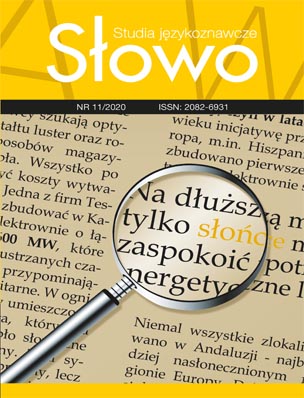„Tu wszystko ma insze imię” – semantic changes in the Polish language spoken by descendants of Polish immigrants in Brazil
DOI:
https://doi.org/10.15584/slowo.2020.11.5Keywords:
Polish language in Brazil, Polish-Brazilian dialect, semantic change, language contactAbstract
The object of this research are lexical semantic changes in Polish language spoken by descendants of Polish immigrants who live in a rural community in southern Brazil. The aim is to analyze the semantic changes which emerged as a result of language contact with Brazilian Portuguese and to state if there is a semantical motivation between the primary meaning (brought by the immigrants) and the new meaning of the lexemes. The data used for the research was extracted from interviews conducted with nineteen Polish descendants. In the data there were found 64 lexemes which underwent a contact-induced semantic change. In 83% of cases there is a semantic link between the primary and the new meaning, which proves that the contact-induced semantic change can be subject to similar mechanisms that result in semantic change within one language only. The mechanisms observed most frequently in the data are generalization and metaphorization.Downloads
References
Buttler D., 1978, Rozwój semantyczny wyrazów polskich, Warszawa.
Cardoso P., 2016, Plataforma do Letramento: O Brasil e suas muitas línguas. Instituto de Investigação e Desenvolvimento em Política Linguística, http://ipol.org.br/tag/linguas-do-brasil/ [dostęp 15.08.2020].
Decreto-Lei no 406, de 4 de Maio de 1938, http://www2.camara.leg.br/legin/fed/declei/193-1939/decreto-lei-406-4-maio-1938-348724-publicacaooriginal-1-pe.html [dostęp 16.08.2020].
Doroszewski W. (red.), 1958, Słownik języka polskiego, Warszawa, http://sjpd.pwn.pl [dostęp 20.08.2020] (SJPD).
Dubisz S., 2014, Językoznawcze studia polonistyczne, t. 2: Polonia i jej język, Warszawa.
Geeraerts D. 2010, Theories of Lexical Semantics, Oxford–New York.
Goczyła Ferreira A. 2018, Polskość na antypodach: wybrane aspekty historyczne i językowe polskiej obecności w Brazylii, „Postscriptum Polonistyczne”, 1 (21), s. 173–186.
Goczyła Ferreira A., 2019, A presença da língua polonesa na Colônia Dom Pedro II em Campo Largo, Paraná, praca magisterska, Universidade Federal do Paraná, Curitiba.
Grosjean F., 1989, Neurolinguists, Beware! The Bilingual Is Not Two Monolinguals in One Person, „Brain and Language”, nr 36, p. 3–15.
Grzegorczykowa R., 2011, Wprowadzenie do semantyki językoznawczej, Warszawa.
Houaiss A., Villar M. de S., 2001, Dicionário Houaiss da Língua Portuguesa, Rio de Janeiro.
Ianni O., 1987, Raças e classes sociais no Brasil, São Paulo.
Kawka M., 1982, Os brasileirismos do dialeto polono-brasileiro, praca magisterska, Universidade Católica do Paraná, Curitiba.
Kula M., 1981, Polonia brazylijska, Warszawa.
Linde-Usiekiniewicz J., 1997, Język polski w Brazylii [w:] Język polski poza granicami kraju, red. S. Dubisz, Opole, s. 273–285.
Maćkiewicz J., 1999, Słowo o słowie, Gdańsk.
Matras Y., 2011, Language Contact, Cambridge.
Mazurek J., 2006, Kraj a emigracja: ruch ludowy wobec wychodźstwa chłopskiego do krajów Ameryki Łacińskiej (do 1939 roku), Warszawa.
Miodunka W., 1990, Wstęp [w:] Język polski w świecie, red. W. Miodunka, Warszawa–Kraków, s. 9–22.
Miodunka W., 2003, Bilingwizm polsko-portugalski w Brazylii. W stronę lingwistyki humanistycznej, Kraków.
Oliveira M. de, 2009, Os poloneses do Paraná (Brasil) e a questão da nacionalização dos imigrantes (1920–1945), ANPUH – XXV Simpósio Nacional de História, Fortaleza.
Pamiętniki emigrantów. Ameryka Południowa, 1939, nr 1–27, Warszawa.
Pederneira I.L., 2014, Verbos leves no português brasileiro: uma nova proposta, “Revista Linguística Rio”, nr 1, s. 9–16.
Pluta A., 2013, Długa podróż w bardzo krótkim czasie. Biografia Andrzeja Bukowińskiego, Warszawa.
Pluta A., 2015, Ten piekielny polski akcent. Ziembiński na brazylijskiej scenie, Warszawa.
Siewierski H., 2009, Polônia e Brasil: Laços históricos e culturais, „Projeções. Revista de estudos polono-brasileiros”, XI, nr 2.
Silva-Corvalán C., 1986, Bilingualism and language change: the extension of ‘estar’ in Los Angeles Spanish, “Language”, vol. 62, nr 3, s. 587–608.
Słownik języka polskiego, https://sjp.pwn.pl [dostęp 25.08.2020] (SJP).
Stańczewski J., 1925, Wpływ języka portugalskiego na język kolonistów polskich w Brazylii. Studium porównawcze, Curitiba.
Śliwiany M. 1962, Z życia polonii brazylijskiej. „No e iaqtam, gospodaxu, zdrovvo, motsno?”, „Lud”, nr 44, s. 2.
Thomason S.G., 2001, Language Contact, Edinburgh.
Thomason S.G., Kaufman T., 1988, Language Contact, Creolization, and Genetic Linguistics, Berkley–Los Angeles–London.
Wachowicz R.C., 1981, O camponês polonês no Brasil, Curitiba.
Wachowicz R.C., Malczewski Z., 2000, Perfis polônicos, Porto Alegre.
Weinreich U., 1974, Languages in Contact. Findings and Problems, London–The Hague–Paris.
Wierzbicka A., 1990, Podwójne życie człowieka dwujęzycznego [w:] Język polski w świecie, red. W. Miodunka, Warszawa–Kraków, s. 71–104.
Zalizniak A., 2008, A catalogue of semantic shifts. Towards a typology of semantic derivation [w:] From Polysemy to Semantic Change: Towards a typology of lexical semantic associations, red. M. Vanhove, Amsterdam-Philadelphia, s. 217–264.
Downloads
Published
How to Cite
Issue
Section
License
Copyright (c) 2020 Słowo. Studia językoznawcze

This work is licensed under a Creative Commons Attribution-NonCommercial 4.0 International License.


